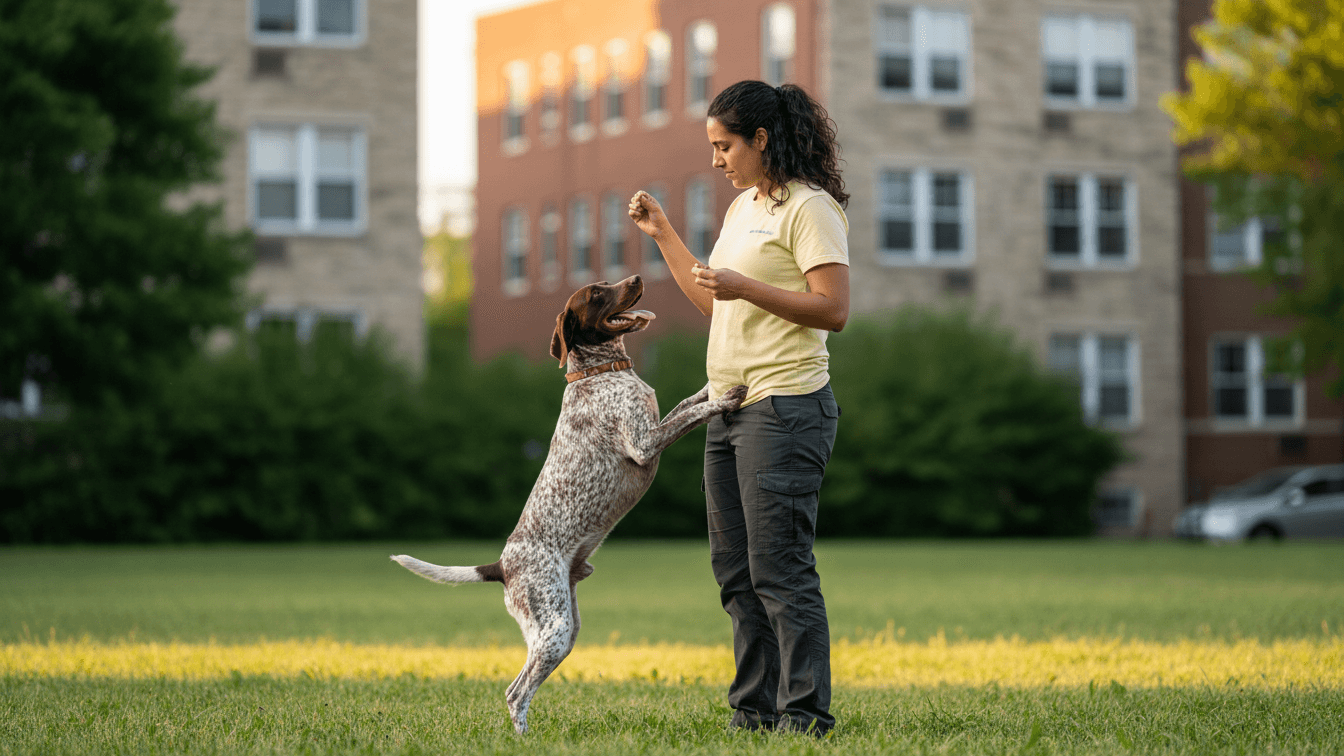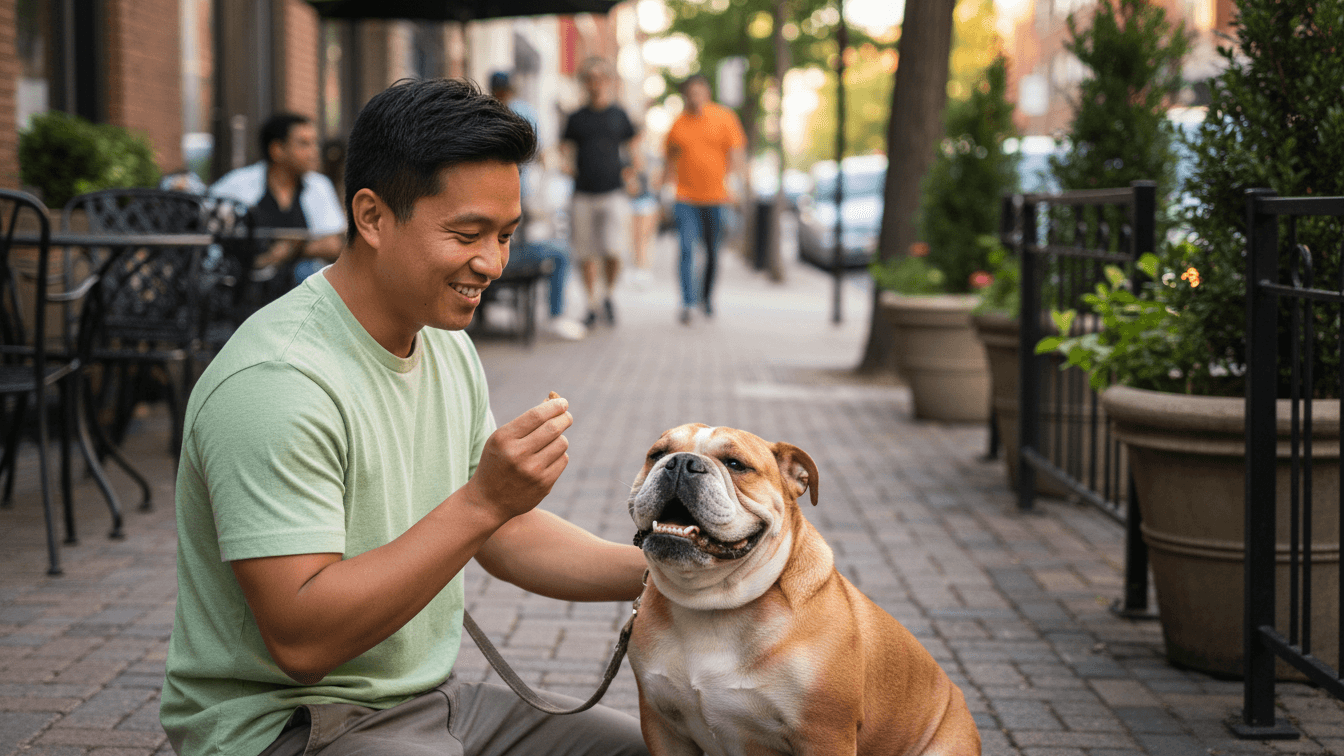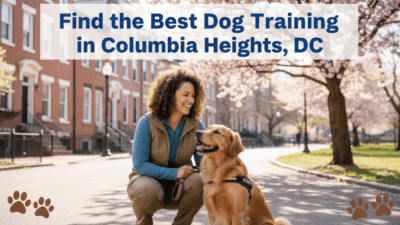Your Complete Guide to Choosing a Dog Trainer in Columbia Heights and Surrounding Areas
Living with a dog in Columbia Heights means navigating busy 14th Street sidewalks, sharing narrow row house hallways with neighbors, and managing crowded park visits at places like Meridian Hill. Your dog needs to stay calm when Metro trains rumble past, ignore other dogs on tight sidewalks, and hold polite greetings when you run into neighbors on your front stoop.
Columbia Heights sits in the District of Columbia, so all local regulations follow DC-specific guidelines. When you find a trainer who understands these urban challenges, you’ll get better results both at home and out in your neighborhood.
How to Choose the Right Trainer
Start by looking for someone who uses positive reinforcement training and understands the unique pressures of dense city living. This means your dog should learn to walk calmly past outdoor dining crowds, stay focused when delivery trucks rumble by, and handle elevator rides without stress or barking.
Credentials give you a quick way to compare trainers’ experience levels. Common dog trainer certifications include KPA-CTP, CPDT-KA, or IAABC-CDBC for behavior problems. If your dog has serious aggression issues, look for someone with CBCC-KA or a science-based program like CTC.
In-home dog training works great for puppy training, door manners, and handling the specific layout of your apartment or townhouse. Group classes make sense once your dog can focus around other dogs, especially before you try busy spots like the Columbia Heights Farmers Market.
A professional dog trainer should also address real-world distractions like sirens, construction noise, and the constant flow of pedestrians that make Columbia Heights such a vibrant neighborhood.
Common Dog Training Methods Explained

Reward-based methods build the trust you want while creating lasting behavior changes. They also help you follow DC’s strict leash laws and noise ordinances that matter when you’re living in close quarters with neighbors.
Basic obedience covers sit, down, stay, place, recall, and leash training so your dog can handle walks, visits to pet-friendly shops along 14th Street, and unexpected encounters with other dogs on narrow sidewalks.
Puppy classes focus on socialization, potty training, bite control, crate comfort, and early leash skills. Starting with short, positive training sessions prevents bad habits from forming in the first place, which matters even more when you’re sharing walls with neighbors.
Behavior modification addresses fear, reactivity, resource guarding, or separation anxiety through careful desensitization and counterconditioning. For serious cases, ask if your trainer works with local veterinarians.
Private lessons and dog training services let you customize everything around your daily routines and your specific living space. Day training can speed up results when you’re short on time.
Obedience training classes help your dog practice good manners around other dogs and people. The best dog training classes give dogs plenty of space, screen participants carefully, and teach calm behavior rather than just excitement.
Specialized training like therapy dog training or service dog training requires extra structure, public-access skills, and a very clear step-by-step program that meets federal standards.
Stay away from trainers who use fear, intimidation, or pain to get results. Humane methods are safer for everyone, easier to maintain long-term, and much better for keeping peace with your neighbors in a tightly packed urban environment.
Average Cost of Dog Training in Columbia Heights DC and Surrounding Areas (Updated for 2025)
Prices around Columbia Heights and the District depend on the trainer’s experience, how long sessions last, and where the training happens. Here’s what most local pet owners are paying in 2025.
| Service Type | Average Cost (Columbia Heights/DC) |
|---|---|
| Puppy classes (4-6 weeks) | $180-$300 total |
| Group obedience classes (4-6 weeks) | $200-$350 total |
| Private lessons (60-90 min) | $135-$220 per session |
| In-home coaching packages (4-6 visits) | $550-$1,100 total |
| Day training (trainer works your dog + handoff) | $550-$1,200 per week |
| Behavior consult for reactivity/anxiety (initial) | $175-$300 |
| Board and train (2-4 weeks) | $2,500-$5,500 total |
You’ll probably pay at the higher end of these ranges for expert dog trainers with advanced certifications or specialized experience in urban environments. Many trainers offer a free consultation to discuss your goals and answer questions before you commit.
Make sure you understand what’s included in your training program, how the trainer tracks progress, and whether they offer follow-up support after your training sessions end.
Questions to Ask a Potential Dog Trainer
- What training methods do you use, and how do you keep sessions positive and low-stress?
- What credentials do you have, like KPA-CTP or CPDT-KA? Do you keep up with continuing education such as CPDT-KSA?
- How will you customize the training plan for my dog’s specific needs and our Columbia Heights lifestyle?
- Do you offer in-home visits, group classes, or day training, and which approach fits my goals best?
- How will we measure my dog’s progress and know when to add more distractions?
- What are the total costs, including any travel fees within DC, and what’s your cancellation policy?
- Do you carry liability insurance, and can you show me proof?
- For behavior problems, will you work with my veterinarian if needed?
- What should I practice between our sessions to help my dog keep improving?
- Have you worked with dogs in urban environments like Columbia Heights before, and how do you address typical city challenges?
Local Columbia Heights Rules and Considerations
The District enforces strict leash laws and noise ordinances to keep neighborhoods safe and livable for everyone. Understanding these rules helps you avoid fines and neighbor complaints.
Dogs must be leashed at all times in public spaces, including sidewalks, parks, and Metro stations, except inside designated dog parks. DC law requires leashes no longer than four feet in most public areas, though some parks allow six-foot leashes.
All dogs in DC must have current rabies vaccination and be registered with the District. You can register your dog and find vaccination information through DC Department of Health. The annual registration fee is $15 for spayed or neutered dogs and $70 for unaltered dogs.
Excessive barking can violate DC noise ordinances, especially during quiet hours between 10 PM and 7 AM. Work with your trainer on alert barking and separation anxiety before neighbors file complaints with DC's Department of Licensing.
The District doesn’t require special licenses for dog trainers, but certified dog trainers should carry liability insurance if they’re working with clients’ dogs. If a trainer offers board and train services, their facility may need to meet specific safety and housing standards.
Dog owners are required to pick up after their dogs immediately, and failure to do so can result in fines up to $500. Always carry waste bags on walks throughout Columbia Heights, Mount Pleasant, Petworth, and other DC neighborhoods.
Local Columbia Heights Resources for Dog Owners
These spots give you great places to practice polite manners, work on recalls, and provide safe enrichment for your dog while helping your dog become a well-behaved companion. Always follow the posted rules and etiquette guidelines.
- Banneker Dog Park at 2700 Georgia Avenue NW offers a fenced area with separate sections for large and small dogs, perfect for practicing recalls and calm greetings during quieter morning hours.
- Meridian Hill Park welcomes leashed dogs and provides excellent opportunities to work on focus around joggers, picnickers, and the Sunday drum circle crowds.
- Walter Pierce Park Dog Park at 3100 Adams Mill Road NW in nearby Adams Morgan gives you another fenced option for safe off-leash practice.
- Rock Creek Park Trail System offers miles of wooded paths where leashed dogs can work on trail manners, wildlife distractions, and varying terrain challenges.

FAQs
How much does in-home dog training cost?
Most Columbia Heights trainers charge $135-$220 per in-home visit, with discounts available when you buy packages. Behavior problems typically start at the higher end of that range, especially when working with reactivity or aggression.
Is in-home dog training worth it?
Absolutely, because you’re working on problems exactly where they happen. Your trainer can fix door manners, jumping on guests, hallway reactivity, and apartment-specific challenges right at home, then step outside to practice leash skills on your actual neighborhood sidewalks with real city distractions.
Can you pay someone to house train your dog?
Yes, many trainers offer puppy programs that include potty training, crate routines, and daily schedules tailored to apartment living. Day training can speed up the process while teaching you how to maintain the progress.
What is the 3-3-3 rule for dog training?
This is a helpful timeline for new or adopted dogs: expect about 3 days for your dog to decompress, 3 weeks to learn your routines, and 3 months to feel completely settled. Good training plans work with this natural adjustment period, which can be even more important when adjusting to urban apartment life.
How long will it take to reach my training goals?
Most puppies and friendly adult dogs show solid progress within 4-8 weeks if you practice daily. Fear, reactivity, or separation anxiety typically requires several months of careful behavior modification with gradual increases in difficulty.
What should I bring to group classes?
Pack a flat collar or harness, a 4- to 6-foot leash, high-value treats, water, and current vaccination records if your trainer requests them. Leave retractable leashes at home for safety reasons, especially in crowded DC class environments.
What’s the leash law in Columbia Heights?
Dogs must be leashed and under control in all public areas throughout Columbia Heights and the rest of DC, except inside designated off-leash dog parks. DC law requires leashes no longer than four feet in most public spaces, though some parks allow up to six feet.
Do I need a dog license in Columbia Heights or DC?
Yes, all dogs in the District must be registered annually with DC Department of Health. The fee is $15 for spayed or neutered dogs and $70 for unaltered dogs. Registration helps reunite lost pets with owners and proves your dog’s rabies vaccination is current.
What shots does my dog need in DC?
Rabies vaccination is required throughout the District. Your veterinarian may also recommend distemper-parvo and bordetella based on your dog’s lifestyle, especially if you plan to use group classes or dog parks.
Are dog trainers required to be licensed in Columbia Heights or DC?
No special trainer licenses exist in the District. Trainers follow normal business regulations, but reputable professionals carry liability insurance and hold recognized certifications from organizations like the Certification Council for Professional Dog Trainers.
Where can I practice off-leash recall?
Use fenced dog parks like Banneker Dog Park or Walter Pierce Park Dog Park to keep things safe and legal. Try visiting during quieter hours when you’re starting out, and always supervise closely.
Which dog parks allow training around Columbia Heights?
Banneker Dog Park and Walter Pierce Park Dog Park both allow off-leash play within their fenced areas, making them ideal for practicing recalls and socialization. Always follow posted rules and be respectful of other dog owners.
What trails allow dogs for training?
Rock Creek Park welcomes leashed dogs on most trails, giving you perfect opportunities to build focus around joggers, cyclists, wildlife, and families. The Capital Crescent Trail and C&O Canal Towpath also allow leashed dogs and offer longer routes for endurance training.
How do I find the best dog trainer for my needs?
Look for trainers who understand urban living challenges, hold recognized certifications, use positive reinforcement, and offer a free evaluation to assess your dog’s specific needs. Check reviews from other Columbia Heights residents and ask about their experience with city dogs.
What if my dog is reactive to other dogs on walks?
Reactivity is common in dense urban areas where dogs have limited escape routes on narrow sidewalks. A qualified trainer can help your dog learn to stay calm through behavior modification techniques, but progress takes time and consistency. Start training during quieter hours and gradually build up to busier times of day.
The right combination of thoughtful planning, humane methods, and consistent practice around Columbia Heights will help your dog become a confident, well-behaved companion. Whether you choose private lessons, group classes, or board and train, finding a top dog trainer who understands the unique challenges of city living makes all the difference in creating the peaceful, enjoyable relationship you want with your dog.
